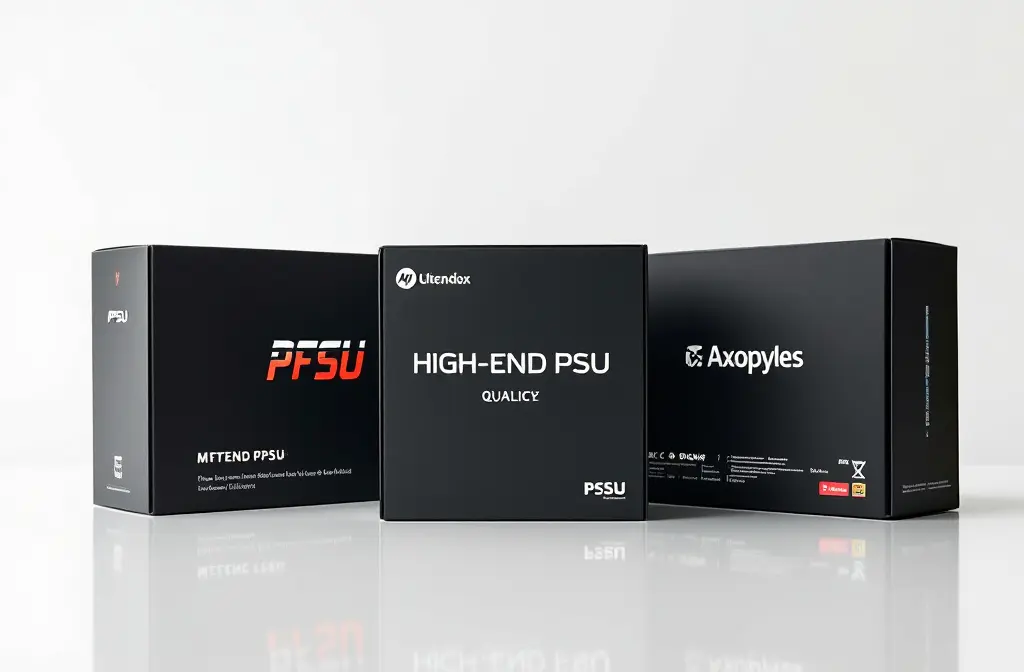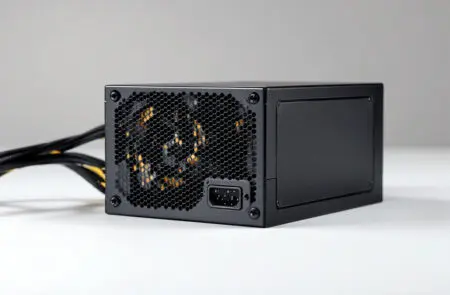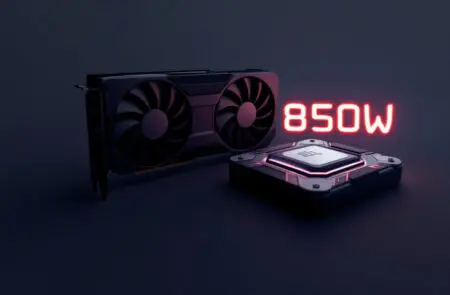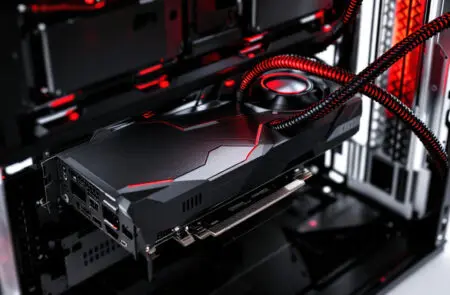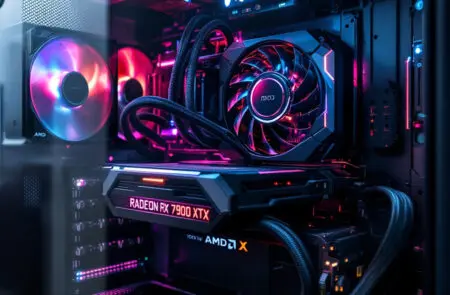I’ll never forget the magic of building my first real gaming PC. The smell of new electronics, the meticulous process of laying out each component on the anti-static mat—it felt like a sacred ritual. I was a teenager who had saved every last dime from a summer job, and this machine was my masterpiece. I obsessed over the graphics card, agonized over the CPU, and picked a case with the coolest lights. And the power supply? I grabbed whatever was on sale. It’s just a box with some wires, I thought. How different could they be?
That was a mistake. A big one.
Thankfully, my own rig survived my ignorance. But a few years later, I watched a friend’s dream build turn into a nightmare. He’d dropped serious cash on a top-of-the-line GPU and CPU but decided to save a few bucks on the power supply. The result was a PC that was powerful on paper but a nervous wreck in practice. It would crash randomly in the middle of a firefight, reboot for no reason, and generally act possessed. His beastly machine was being starved of stable power.
That’s when the lesson truly hit home for me: the power supply unit (PSU) isn’t just another part on the list. It’s the heart of the entire system. It’s the unsung hero that takes the chaotic, unpredictable electricity from your wall and transforms it into the clean, stable lifeblood your delicate components crave. Choosing from the best PSU brands for a gaming PC is the first, and most important, step in building a machine that won’t let you down.
More in Power Supplies Category
What is The Best Power Supply For an AMD Radeon RX 7800 XT
What is The Best Power Supply For an AMD Radeon RX 7900 XTX
Key Takeaways
- Don’t Treat the PSU as an Afterthought: Your power supply is the foundation of your entire build. A cheap, low-quality unit can actively damage your expensive components or cause maddening instability.
- Brand Reputation is Your Best Guide: In the world of PSUs, trust is earned, not given. Brands like Corsair, Seasonic, and be quiet! have spent years building a reputation for reliability and quality engineering.
- Gold is the Sweet Spot for Efficiency: An 80 Plus Gold rating ensures your PSU wastes less energy as heat, leading to a cooler, quieter PC and a lower power bill. It’s the perfect balance of price and performance.
- Go Modular for a Clean Build: Fully modular and semi-modular PSUs allow you to use only the cables you need, which makes the building process easier and dramatically improves your case’s airflow.
- Buy More Watts Than You Need Today: Give yourself some breathing room. A PSU with 20-30% wattage headroom will run more efficiently and give you the freedom to upgrade your GPU in the future without having to buy a new power supply.
So, Why Does a Power Supply Even Matter That Much?
Let me put it this way. You wouldn’t put cheap, murky, watered-down gas in a Ferrari. You wouldn’t build your dream house on a foundation of crumbling sand. So why on earth would you trust a generic, no-name box to power your multi-thousand-dollar gaming rig? It’s a recipe for disaster. Every single component in your PC, from the mighty CPU to the humble case fan, is completely and utterly reliant on the PSU for survival.
The power that comes out of your wall socket is alternating current (AC). It’s wild, messy, and totally unsuitable for the delicate circuits in your computer. The PSU’s job is to perform a miracle of electrical engineering: it converts that high-voltage AC into several precise, stable, low-voltage direct current (DC) rails. These are the +12V, +5V, and +3.3V rails that your components actually feed on.
But it’s not just about simple conversion. A high-quality power supply does this with incredible precision, maintaining those voltages with rock-solid stability, even when the load changes violently. Picture this: you’re in the middle of a massive explosion in Cyberpunk 2077. Your graphics card suddenly screams for a massive spike of power. A good PSU delivers it instantly, without even flinching. A cheap one? It might sag, causing the voltage to dip, which can lead to a game crash, a system reboot, or worse—sending a destructive power surge that could fry your expensive hardware for good.
What’s the Deal with Those 80 Plus Ratings?
When you start browsing for PSUs, you’ll see these little metallic-looking logos everywhere: 80 Plus Bronze, Silver, Gold, Platinum, Titanium. This isn’t just some marketing gimmick cooked up to get you to spend more money. It’s a big deal. The 80 Plus certification is a standardized, independent program that verifies a PSU’s energy efficiency.
Simply put, the rating tells you how good the PSU is at converting AC power from the wall into DC power for your PC. During this conversion, some energy is always lost as waste heat. An 80 Plus certified PSU is guaranteed to be at least 80% efficient, meaning a maximum of 20% of the electricity it pulls is wasted. The better the metal, the higher the efficiency.
- 80 Plus Bronze: A solid entry point. At least 85% efficient at a 50% load.
- 80 Plus Gold: The sweet spot for most gamers. At least 90% efficient at a 50% load.
- 80 Plus Platinum: A premium choice for enthusiasts. At least 92% efficient at a 50% load.
That wasted energy has to go somewhere, and it goes directly into heating up your room and the inside of your PC case. A more efficient PSU runs cooler, which means its fan doesn’t need to spin as fast or as loud. It’s a chain reaction of goodness that results in a quieter, cooler, and more energy-conscious gaming rig.
Is Bronze Good Enough, or Should I Go for Gold?
This is the million-dollar question for anyone trying to balance a budget. And here’s the straight answer: for a build where every single dollar counts, a quality 80 Plus Bronze unit from a trusted brand is perfectly fine. It’s a safe, reliable choice and a monumental leap in quality compared to a cheap, uncertified power supply.
However, for the vast majority of gamers, 80 Plus Gold is the undisputed champion. A few years ago, the price jump from Bronze to year was significant, but today, that gaps, m shrunk dramatically. For a relatively small increase in cost, you get a PSU built with higher-quality internal components, better performance under load,term tangible energy sa savings on your power bill. The parts needed to hit that 90% typically markof a inherently more robust, which directly translates to a longer, more reliable lifespan for your PSU.Titanium units are tecly s fantastic, but they represent a point of diminishing returns for most users. Stick with Gold; your PC will thank you.re making a smart investment.
How Do I Know How Many Watts My Gaming PC Needs?
Choosing the right wattage can feel like a black art, but it’s actually pretty straightforward. The two components that consume the most power by a huge margin are your Central Processing Unit (CPU) and your Graphics Processing Unit (GPU). The manufacturer of your GPU will usually provide a “minimum recommended PSU wattage” on their website, which is a great starting point.
For a more precise estimate, you can use an online PSU calculator tool. Websites like PCPartPicker automatically tally the estimated wattage of all the components in your build list, which is incredibly helpful. Another excellent resource is the OuterVision Power Supply Calculator, which allows for more granular control, letting you factor in things like overclocking and peripherals.
The golden rule, however, is to always buy more than you need. Aim for about 20-30% “headroom” above your system’s estimated peak power draw. There are two huge reasons for this. First, power supplies operate at their highest efficiency when they are under 50-70% of their maximum load. Running a PSU too close to its limit makes it less efficient, hotter, and louder. Second, that headroom gives you room to grow. I learned this lesson myself.
A few years back, I built a new rig and figured a 650W PSU was plenty for my needs at the time. A year later, I found an incredible deal on a much more powerful graphics card. The problem? It was a power-hungry beast, and my 650W unit was suddenly sailing dangerously close to its maximum output. I had to buy a whole new PSU just for that one upgrade. If I had just spent a little extra on an 850W unit from the start, I would have saved myself a major headache and a hundred bucks.
Modular, Semi-Modular, Non-Modular… Am I Studying for a Test?
This sounds complicated, but it’s just about the cables. The terminology simply describes how the power cables are attached to the PSU box itself, and it has a massive impact on the building process.
So, What Does Non-Modular Mean for My Build?
A non-modular PSU is the most basic and budget-friendly option. All of its cables are permanently hardwired into the unit. This means you have a big bundle of every possible cable—SATA power, PCIe for the GPU, motherboard power, everything—coming out of the box, whether you need them all or not. The upside is a lower price point. The downside is a major challenge in cable management. You’ll be left with a nest of unused cables that you have to tuck away somewhere in your case, which can obstruct airflow and make for a messy-looking build. It’s functional, but far from elegant.
Is Semi-Modular the Best of Both Worlds?
A semi-modular PSU offers a fantastic compromise. The essential, must-use cables—typically the 24-pin motherboard power and the 8-pin CPU power—are permanently attached. All the other cables, like the PCIe cables for your graphics card and SATA power cables for your drives, are detachable. You only plug in the ones you actually need. This drastically reduces clutter compared to a non-modular unit, making the building process much cleaner and more enjoyable. For many builders, semi-modular hits the perfect balance between price and convenience.
Why Would I Want a Fully Modular PSU?
A fully modular PSU is the premium choice. As the name implies, every single cable is detachable, including the main motherboard and CPU power connectors. This provides the ultimate level of flexibility and is a dream come true for anyone who cares about a clean, professional-looking build. You use only the exact cables you need, resulting in minimal clutter, optimal airflow, and an incredibly tidy interior. The first time I built a PC with a fully modular power supply, it was a revelation. The case interior looked so spacious and professional, and I’m convinced the improved airflow helped drop my component temperatures by a few degrees. For enthusiasts and perfectionists, the extra cost is absolutely worth it.
Alright, Let’s Talk Brands. Who Can I Actually Trust?
Now we get to the heart of the matter. While many companies slap their logo on a power supply, only a handful of them have consistently proven their commitment to quality engineering, high-end components, and long-term reliability. When you’re looking for the best PSU brands for a gaming PC, these are the names that should be at the top of your list.
Is Corsair Really the King of PC Components?
If there’s one brand that is nearly synonymous with high-performance PC building, it’s Corsair. They’ve built an empire on a reputation for quality, and their power supplies are no exception. They offer an incredibly wide range of PSUs, from budget-friendly CV and CX series units to their enthusiast-grade RMx, HX, and top-of-the-line AX series.
What sets Corsair apart is their consistency and outstanding customer support. Their most popular lines, like the RMx series, are renowned for using top-quality Japanese capacitors, offering excellent voltage regulation, and running incredibly quietly. Plus, they back their premium units with long 10-year warranties, which is a powerful statement of confidence in their own product. You simply cannot go wrong choosing a Corsair PSU.
I Keep Hearing About Seasonic. Are They the Secret GOAT?
For many hardcore PC enthusiasts, Seasonic is the undisputed champion. What many people don’t realize is that Seasonic is a major OEM, or Original Equipment Manufacturer. This means they not only design and build their own highly-rated power supplies, but they also manufacture the internal platforms for many other reputable brands.
When you buy a Seasonic-branded PSU, like one from their excellent PRIME or FOCUS series, you are getting a product straight from the source. They are famous for their world-class engineering, incredibly tight voltage regulation, and flawless build quality. They are often considered the “engineer’s choice,” a brand for those who prioritize raw electrical performance above all else. Their commitment to quality is legendary, and they are easily one of the most trusted names in the industry.
What’s the Story with be quiet!? Are They Just for Silent Builds?
As their name suggests, be quiet! has carved out a niche by focusing on ultra-quiet operation. They achieve this by using their own high-quality, fluid-dynamic bearing fans (like the famous Silent Wings) and optimizing the fan curves for minimal noise. But don’t let the name fool you into thinking they sacrifice performance for silence.
Their premium power supply lines, such as the Dark Power Pro and Straight Power series, are top-tier performers that compete directly with the best from Corsair and Seasonic. They boast excellent efficiency, rock-solid stability, and premium German engineering. If you are building a PC where low acoustic levels are a top priority, but you refuse to compromise on power and reliability, be quiet! should be at the very top of your list.
Isn’t Cooler Master a Case and Fan Company?
While Cooler Master is famous for their cases, coolers, and fans, they have also become a formidable player in the power supply market. For years, they produced solid mid-range units, but recently they have made a serious push into the high-end space. Their V series and MWE Gold series power supplies, in particular, have received excellent reviews from technical publications for their performance and reliability. They often partner with top-tier OEMs to produce their units, ensuring a high level of quality. Cooler Master can be a fantastic choice, often providing performance that is competitive with the other top brands but at a slightly more accessible price point.
Are There Any Other Brands Worth Considering?
Absolutely. While the four mentioned above are arguably the most dominant, other brands produce fantastic units. EVGA built a stellar reputation with their SuperNOVA line of PSUs, many of which were based on excellent OEM platforms. Thermaltake has also upped their game significantly with their Toughpower series. Antec and SilverStone are two other legacy brands that have been producing quality power supplies for decades and continue to be a trusted choice for many builders.
What Are the Biggest Red Flags When Buying a PSU?
Navigating the market can be tricky, especially with so many obscure brands out there. To protect your build, keep an eye out for these major red flags:
- Unknown Brands: If you’ve never heard of the brand and a quick search brings up little to no professional reviews, stay away.
- “Too Good to Be True” Pricing: A 1000W power supply selling for $50 is a massive red flag. Quality components cost money, and a price that low is a sure sign of cut corners.
- Missing or Fake 80 Plus Certification: Any reputable PSU will proudly display its 80 Plus rating. Be wary of units with no certification or those with suspiciously fake-looking logos.
- Short Warranties: The best brands offer 7-12 year warranties on their premium PSUs. A short warranty of 1-3 years indicates the manufacturer doesn’t expect their own product to last.
- Feather-Light Weight: Good power supplies are heavy. They are packed with large capacitors, transformers, and heatsinks. If you pick up a high-wattage PSU and it feels surprisingly light, that’s a bad sign.
How Does a PSU Actually Affect My Gaming Performance?
This is a key point of clarification. Buying a 1200W Platinum PSU will not magically give you more frames per second than an 850W Gold PSU, assuming both are high-quality units providing sufficient power. A PSU’s impact on performance isn’t direct; it’s indirect and related to stability.
High-end components need exceptionally clean power to operate at their peak potential. “Clean power” refers to the PSU’s ability to maintain a steady voltage with minimal fluctuation, a technical characteristic known as ripple suppression. As explained by the University of Washington’s Department of Electrical & Computer Engineering, stable DC voltage is critical for the proper function of complex digital circuits.
A cheap power supply with poor voltage regulation and high ripple can introduce instability into the system. This can manifest as micro-stutters, application crashes, or even the dreaded Blue Screen of Death. A great PSU provides a solid, unwavering foundation of power, allowing your CPU and GPU to boost to their highest clocks and perform exactly as they were designed to, without being held back by electrical noise or voltage droops.
In conclusion, the power supply is the unsung hero of every great gaming PC. It’s the component that enables every other part to perform at its best. Resisting the temptation to cut corners here is one of the smartest decisions you can make as a builder. You wouldn’t put cheap, questionable fuel in a performance car, and your gaming PC deserves that same level of respect. By investing in one of the best PSU brands for a gaming PC, you’re not just buying a component; you’re buying reliability, stability, and most importantly, peace of mind.
FAQ – Best PSU Brands for a Gaming PC
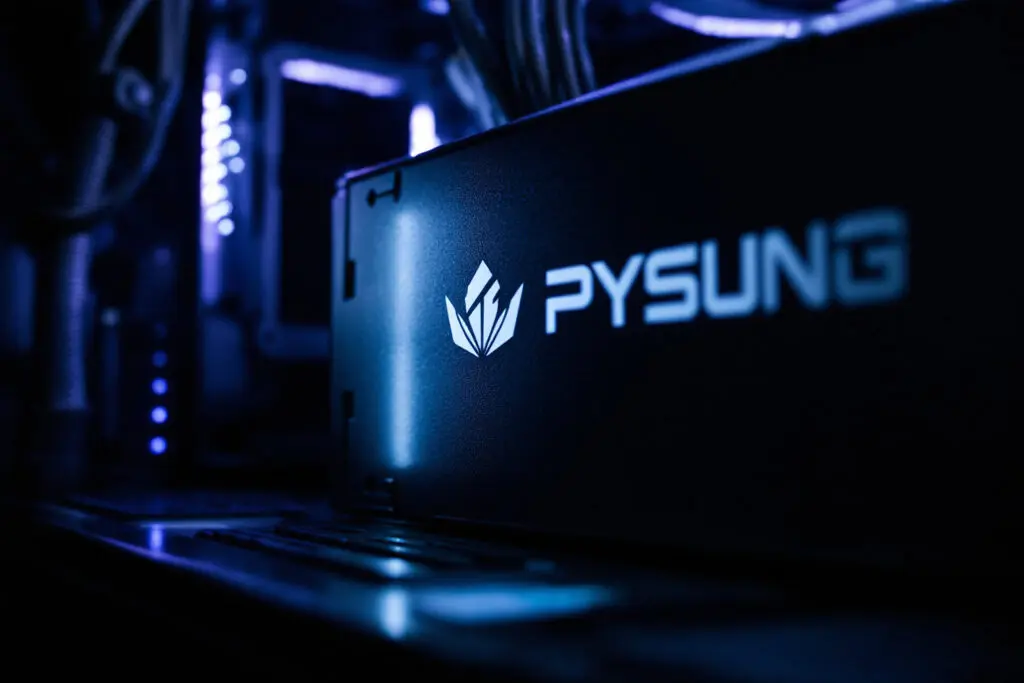
Which brands are the most trusted for high-quality gaming PC PSUs?
Top trusted brands include Corsair, Seasonic, be quiet!, Cooler Master, EVGA, Thermaltake, Antec, and SilverStone, known for their reliability, high-end components, and long warranties.
What is the difference between modular, semi-modular, and non-modular PSUs?
A non-modular PSU has all cables permanently attached, which can make cable management difficult; semi-modular units allow some cables to be detached for easier building; and fully modular PSUs have all cables detachable, offering maximum flexibility and a cleaner build.
How do I determine the right wattage for my gaming PC’s power supply?
You should calculate your system’s maximum power draw, often using online PSU calculators or manufacturer recommendations for your GPU and CPU, and then choose a PSU with about 20-30% more wattage to ensure efficiency, stability, and room for upgrades.
What are the benefits of choosing a PSU with an 80 Plus Gold rating?
An 80 Plus Gold PSU is at least 90% efficient at a 50% load, meaning it wastes less energy as heat, runs cooler and quieter, reduces power bills, and provides more reliable power delivery, making it an excellent choice for gaming PCs.
Why is the power supply unit (PSU) considered the most important component in a gaming PC build?
The PSU is vital because it converts wall electricity into stable, precise power that all other components rely on for optimal performance and longevity. A high-quality PSU ensures system stability and protects valuable hardware from power surges and fluctuations.

